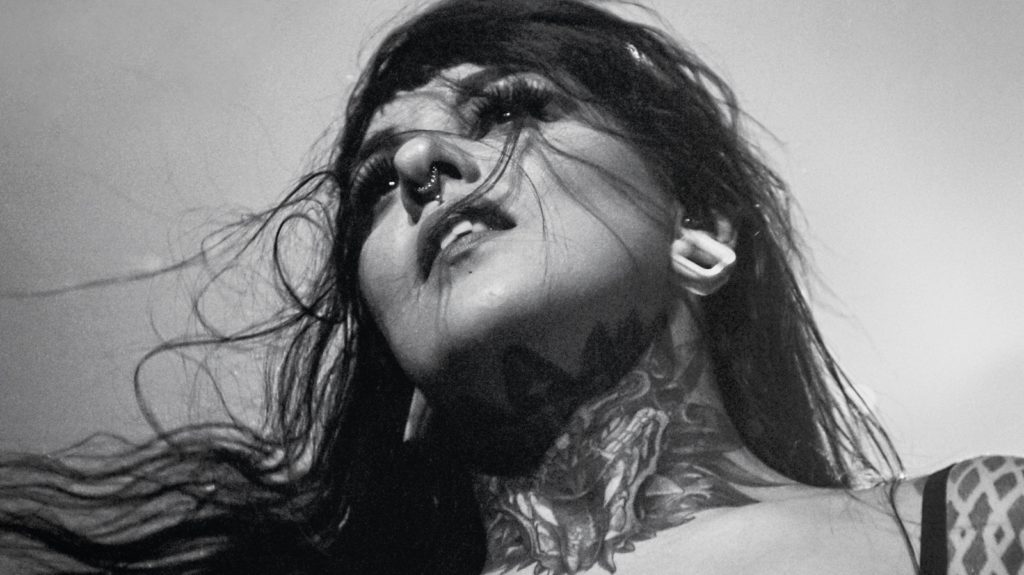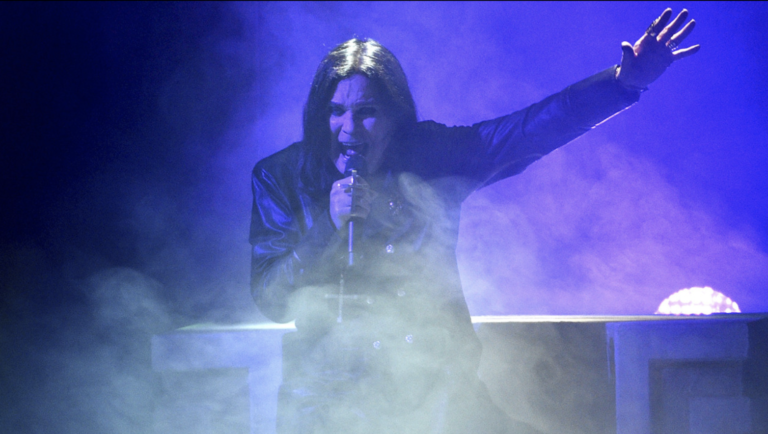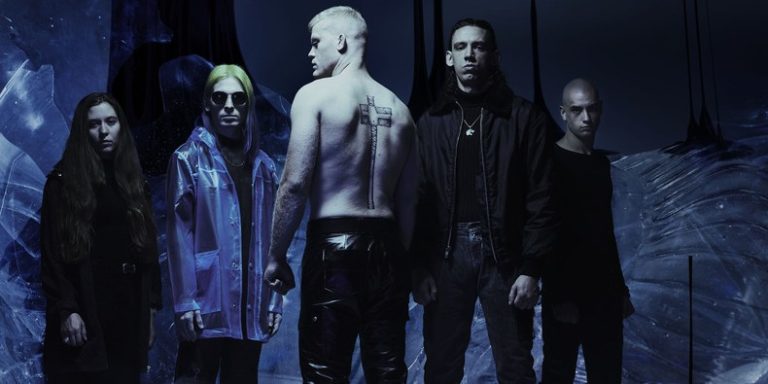FROM WARZONES TO MOSH PITS: THE EVOLUTION OF JINJER’S TATIANA SHMAILYUK via Revolver

“Sometimes it’s calm and peaceful, but sometimes people [are] just waiting for something to happen. Right now at least it’s not being bombed, so that’s good.”
Jinjer vocalist Tatiana Shmailyuk is talking about her hometown of Horlivka, in the Donetsk province of Ukraine. She and her bandmates — bassist Eugene Abdiukhanov, guitarist Roman Ibramkhalilov and drummer Vladislav Ulasevich — first escaped Donetsk in 2014, not long after the ongoing conflict between the Ukrainian military, anti-government protestors and pro-Russian rebels began. “It’s better that we moved when we did,” she says, “because in later months it was really impossible to cross the region borders.”
In fleeing the warzone, the band moved nearly 800 miles away to a suburb near the city of Lviv, not far from the Polish border. “But we got bored there because it’s a city for tourists,” Shmailyuk explains. “We rented a house but it was impossible to live there because there were problems with water, with electricity, heating. So that’s why we moved to [a] more civilized place.”
Today, Shmailyuk lives in the Ukrainian capital of Kiev. As she speaks with Revolver, she’s packing her bags for a European tour on which Jinjer will open for veteran Scandinavian metal squads Amorphis and Soilwork. She and her bandmates will be debuting tunes off their new EP, Micro, a groove-laden fusion of techy nu-metal and staccato djent spearheaded by Shmailyuk’s vocals, which seesaw from feral roars to R&B-inflected melodies. Jinjer formed a decade ago, but have only recently begun to make waves in the U.S. — they toured North America for the very first time in 2018.
Shmailyuk was singing — and roaring — long before Jinjer. “My mother told me I started screaming when I was a very little girl,” she says. “I screamed so loud I had a hernia in my belly.” When she wasn’t screaming, she’d belt out the Russian and Ukrainian pop songs she heard on the radio. The insanely popular 1989 dance song “Lambada,” by the French-Brazilian group Kaoma, was another favorite. “I still sing along [to that song] with great joy, although I do not know Portuguese,” she says with a laugh.
Shmailyuk began singing more seriously at age eight. She took vocal lessons for a couple of months and made her onstage debut that year. “It was in a concert hall with a choir,” she recalls. “The songs were accompanied with dancing. I was very nervous, and of course I screwed it up [because of the] dancing. So I said, ‘Never again.’ I cannot do synchronic dancing with someone else. I need to do it alone so I can control the whole thing.”
Soon, her older brother was turning her onto the more popular Russian metal and rock bands of the day, like Aria — the long-running Moscow metal outfit hailed as the “Iron Maiden of Russia.” “A lot of people in Donetsk, and especially my native city Horlivka [were] very musical, especially if we speak about metal,” she says. “There were a lot of great bands. My older brother was a musician, too. He was a guitar player, and he played some kind of very dark doom, black shit.”
When the Soviet Union collapsed in 1991, the changes came fast and furious. MTV hit the Ukrainian airwaves, bringing with it the likes of Nirvana and the Offspring. “When I heard Nirvana, I forgot about Russian rock,” Shmailyuk says with a laugh. “Fuck it! MTV was fantastic. I started listening to Offspring, and I considered myself the biggest Offspring fan in our town. My father taught me how to record music from the TV set onto tape. I started exchanging tapes with my friends and classmates. That’s how we shared our musical experience as listeners.”
Which is how she eventually heard L.A. nu-metal squad Otep, led by the intensely aggro vocalist Otep Shamaya. “I think I was 15 when I heard Otep the first time,” she recalls. “I said, ‘This dude is so cool!’ And my friend said, ‘This is a girl!’ I was like, ‘Jesus fucking Christ!’ This is the first girl I am hearing do this. I was shocked, and I wanted to shock people like her.”
Shmailyuk got to meet her hero last year, when Jinjer toured the U.S. with DevilDriver. “Otep came to our show in L.A. at the Whisky A Go Go,” she says. “We had a party afterward and I met her. I don’t remember what we talked about because I got drunk. But I remember expressing a bunch of words of admiration to her.”

Jinjer’s Tatiana Shmailyukphotograph by Michal Bochenek
In 2009, Shmailyuk went to her first metal show when Soulfly came to Kiev. “This was the only metal show I saw before I became a musician,” she explains. “But I only saw half the show. My boyfriend at this time got drunk and had a fight with someone. We had to leave because the security guys — they kicked our asses out. So he spoiled the evening.”
These days, Shmailyuk spends as much time as possible on tour. As if the ongoing conflict wasn’t enough to keep her away from Ukraine, she finds the region’s lingering Soviet attitudes unappealing. Though she was just four years old when the USSR collapsed, the remnants of hardline communism surround her. “I was too young to remember life in Soviet Union, but the spirit of Soviet Union is still here,” she says. “I’m living in an apartment built maybe 40 years ago, and my parents live in such an apartment, as well. All our shops and supermarkets are situated in buildings built then. So it is still like Soviet Union. And there are a lot of people who still have Soviet Union in their heads and their minds.”
Her dim view of humanity isn’t restricted to her homeland. On the new Jinjer single “Ape,” she addresses her uneasy relationship with, well, everyone. “I don’t like mankind,” she says with a laugh. “I know that something went wrong in our evolution. This causes a wave of anger inside of me, so I wrote the lyrics about a human being who evolved from a fetus to a disaster life. Although we are so small on this earth, we act like we are fucking gods. And that is sad. So I wrote the lyrics imagining myself as Mother Nature, saying, ‘What have I done?'”
In an effort to improve her own standing with Mother Nature, Shmailyuk went vegan about two years ago. But it doesn’t always stick. “I still try being vegan, but it’s really hard for me because I was raised in a family that was not very rich,” she explains. “We could not afford eating meat very often. So when I stopped eating meat, I realized that I loved meat a lot. When I smell meat, it drives me crazy. Something inside of me forgets about animals, suffering, health, environment, and I just want a good piece of meat.”
She says the health benefits are especially easy to forget, mostly because she’s never experienced them. “I didn’t get thinner — I actually got fatter!” She laughs. “I don’t know why. But I am still trying, in the name of the planet and animals. But it doesn’t work so far. When I am home, I am eating only vegan food. But when I am on tour, it’s really hard because I cannot find a lot.”
Luckily, she has a solution that combines her vegan aspirations with her carnivorous cravings. “If I could eat human flesh, I would probably do it,” she says, perhaps only half-joking. “If we are so voracious, why not try eating each other?”




